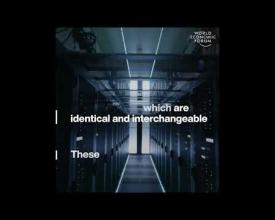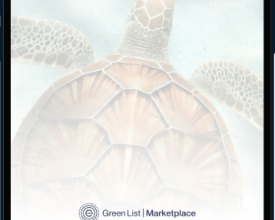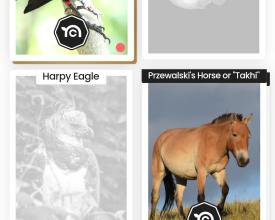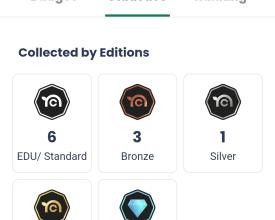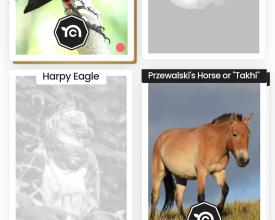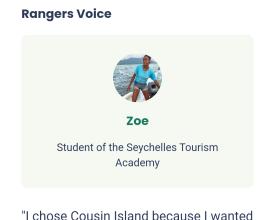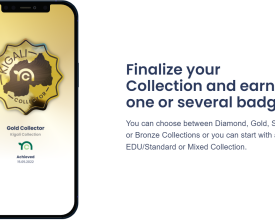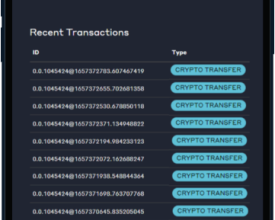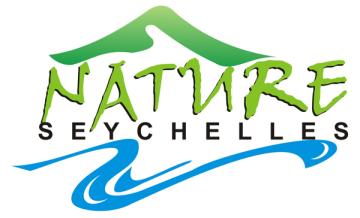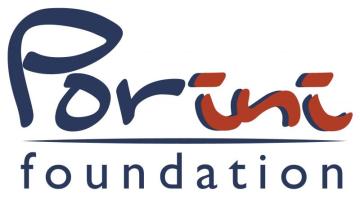
Nature Collectibles - Collect&Conserve
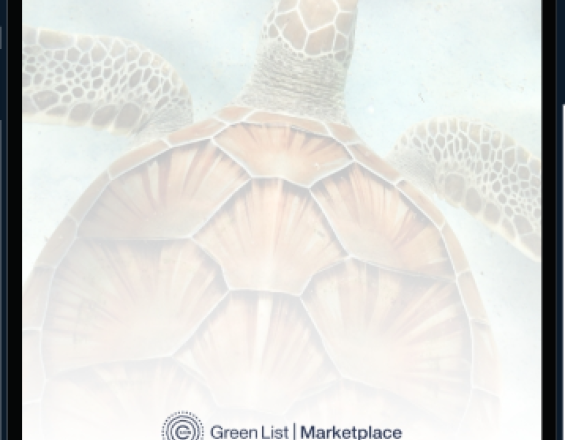
IUCN together with the Swiss PORINI Foundation launched NatureCollectibles (NCs), a new and innovative way to make biodiversity assets tradeable. NCs are digital representations of a species connected to a real-world nature conservation project. They are written to Porinis zero-carbon blockchain where they cannot be copied or multiplied, making them unique and tradeable, like a piece of art.
We invited 8 protected and conserved areas (PCAs) from 6 continents to present their work at the first African Protected Areas Congress in Kigali and developed a mobile app where these digital twins can be collected and traded. People can now take part in ongoing conservation action.
We collected over 16’000 USD in the first 2 months and any user can see on the APP that 100% of his contribution is sent to the PCA.
In October, we will launch the next collection featuring 8 species from 8 PCAs in Madagascar and over the next 5 years, a total of 512 species in 64 different collections will be added.
Context
Challenges addressed
Underfunded conservation action in different areas has always been a real challenge, that only got even more difficult during the pandemic.
Blockchain in combination with an innovative approach to collect and trade digital twins of real-world conservation species allows protected or conserved areas to raise funds across legal borders and communities and to support high level conservation work with recurrent funding.
100% of the collected funds (first sale) are immediately sent over the blockchain to the conservation actor, normally the organization responsible for the PCA or doing the conservation work for the PCA authority.
All cards are limited to 500 NCs per PCA, so collectors can buy cards and when all cards are sold, the collector can resell his card at a higher price (rarity). The collector gets 50% of the new selling price, which can be more than he paid, so his initial payment can turn into a investment and the other 50% of every resale are supporting nature conservation work.
Location
Process
Summary of the process
We combined all the building blocks in one mobile app and used blockchain technology as underlying technology feature. This allows us to create a innovative solution for Nature Conservation which is playfull and simple to use. The App allows the protected or conserved areas to show their conservation work to a global community and to connect to a new audiance of collectors in the crypto space. Trading NCs or other biodiversity assets on blockchain is generating recurrend funding for 512 PCAs participating in 64 collections around the world.
Building Blocks
Monetarisation of Biodiversity assets
Nature Collectibles are digital twins of real world species and allow the monetarisation of biodiversity assets over a net zero-carbon bockchain
Enabling factors
The ease of collecting and trading NatureCollectibels, the digital twin of a species in a specific area, which allows real biodiversity assets to be monetarised.
Lesson learned
Monetarising nature assets is a difficult issue but digital representations on blockchain are a simple way to generate funding for protected and conserved areas
Resources
Mobile Application
We developed a user-friendly mobile application which can be downloaded over the official stores. People can now save endangered species by buying a digital token
Enabling factors
Building a zero-carbon blockchain allowed us to lauch NCs in a sustainable way nand to make these digital twins globally tradeable.
Lesson learned
A mobile app allows us to present a custom interface which is easy to use and to hide our technology behind it. Everybody "knows" mobile Apps ;-)
Collect&Conserve
Nature Collectibles are digital twins of a real world species or NFTC (non-fungible tokens for conservation) living on a zero-carbon blockchain. They can be collected and traded and create non-ear-marked funding for protected and conserved areas.
Enabling factors
The unique aspect of those non-fungible tokens that represent a conserved species in a protected or conserved area. They are written to a zero-carbon blockchain where they cannot be copied or multiplied, making them a unique and rare collectible item, like a piece of art.
Lesson learned
Non-fungible tokens for conservation have great potential but are lacking behind other NFTs, because adaption in the conservation area is especially slow
Resources
Rangers Voice
Using a mobile Application allows us to present informations directly to the user and we invited a person to present their conservation work, a real "voice" from the protected or conserved area.
Enabling factors
The ranger's willingness to be interviewed to illustrate the conservation work in the PCA.
Lesson learned
Having a "face" and a direct "voice" from a person involved in the conservation work is very informative and allows a better bindig to the PCA and the work done for conservation.
Earn your badge
Once you collected 8 different species in a collection, you will receive a badge for your achievement.
Enabling factors
Badges are a playful way to motivate the collector to finalize his collection and donate money to the PCA.
Lesson learned
Playing is a very powerfull way to get to know conservation work.
Transparency
Blockchain allows immediate transactions and to "follow your money". We can therefore show/proof the percentage of donations actually arriving at the PCA.
Enabling factors
We implemented a link to the PCA wallet where collectors can see how their money is added in real time to the PCA wallet in possession of the Conservation actor. To do this, we use a zero-carbon blockchain ito allow the transfer of Nature Collectibles and other assets around the world.
Lesson learned
Transparency is always asked for, and with blockchain, we have a easy way to show the transfers from the collector to the PCA.
Impacts
Protected or conserved areas are traditionally showing their threatened species and natural marvels to tourists, but many PCAs cannot generate sufficient funds to continue their vital conservation work. NatureCollectibles is a innovative and simple way to collect funds for these areas, even if the conservation work is not done for a emblematic species or the PCA cannot be visited by tourists.
Porini Foundation is a specialized charity at the crossroads of nature conservation and blockchain and wants to combine the advantages of both communities. A digital twin of a real world species which can be traded over a zero-carbon blockchain allows a PCA to collect non-ear-marked funding from naturalists and blockchain collectors to cover basic needs of their conservation work.
Blockchain allows full transparency, so if a collector buys a new card, he can immediately see that his money is accounted for in the PCA-wallet on blockchain. As only the PCA has access to their wallet, this guarantees that 100% of the collected money goes to the PCA.
NatureCollectibles is open to all protected areas showing interest and working at the highest standards of biodiversity protection.
New Collections are launched on a regular bases, please get in contact with Porini Foundation for more details on how to participate.
Beneficiaries
Over the next 5 years, 512 protected or conserved areas will benefit from a total of 64 collections of NatureCollectibles.
Sustainable Development Goals
Story
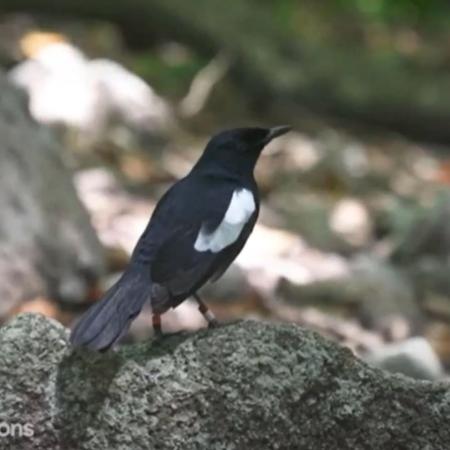
We have been talking about how important it is to innovate during the COVID crisis and we are happy to be early adopters of this innovative technology, we named it – Next-Gen Conservation”, says Dr. Nirmal Jivan Shah, CEO Nature Seychelles
Selling a digital twin of a conserved species over the blockchain to naturalists and crypto collectors allows recurrent and non-ear-marked funding for protected and conserved areas, especially as funding for conservation is not always easy and that protected or conserved areas, as the COVID-19 pandemic showed, can quickly lose a great part of their budget and revenue, especially those relying on touristic income.
With NatureCollectibles, IUCN and Swiss based Porini Foundation can provide sustainable funding and a robuste and innovative financing alternative for conservation work in protected and conserved areas.
By highlighting key conservation species on blockchain, we emphasize the role of the conservation actor and engage with a new audiance and new community which can then actively contribute to conservation efforts.
With NatureCollectibles, we can reach :
- naturalists, collecting digital twins and receiving a badge for their efforts,
- the blockchain community, through issuing a non-fungible token which can be collected and traded, gaining value as a nature asset and
- with young people, to learn about protected species as well as the work of the conservation actor.
All this happens in a simple and playful way over a smartphone APP where collecting, trading digital biodiversity assets and learning is fun and supports real work in protected or conserved areas with recurrient and non-earmarked funding.
